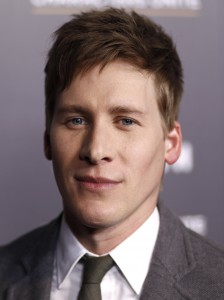When you really know someone, when you really give a damn about them, you want to know what their passion is, as Dustin Lance Black said during the Fall Multicultural Lecture at the College on Tuesday, Nov. 13. He explained that when getting to know someone, you want to know their “why” and you want to understand where they come from and where they want to go in the future.
“What I want to talk about a little more today is not what we do, but why,” said the Academy Award winner for best original screenplay “Milk” at the beginning of his presentation. Black stated that for many members of the LGBT community, himself included, it’s easy to find their “why” in what he calls the coming out story.

“(The coming out story is) that one time when we told our personal story when we had the most to lose,” he said.
Black then continued to describe his own personal story of when he came out to his conservative, Mormon family during winter break of his senior year of college.
In addition to having a very conservative mother, Black compared his relationship with his “tough” older brother to “oil and water.” He said, “I always wondered, would my family ever love me for me?”
On that Christmas Day, Black’s mom came to his bedroom with the “don’t ask don’t tell” policy on her mind. However, she explained that she wasn’t upset over the possibility of excluding someone from the military — she was instead distraught at the idea that these “sick” and “broken” people were allowed to be a part of the United States military. Black tried to hold back tears as she said that, but couldn’t, and he could see the heartbreak in his mother’s eyes.
After the holiday, Black flew back to Los Angeles, with a visit from his mother expected soon after. Yet, his friends were unaware that his mother was conservative and not understanding of the LGBT community.
However, after dinner with his friends, the majority of which were gay or lesbian, his mother finally showed some understanding and compassion.
“I felt myself light up inside, I felt something inside of me that I had never felt before,” Black said. “For the very first time in my life, my mother loved me for me.”
Black believes that through communication, change can happen.
“It’s the power of our personal stories that change minds and change lives,” Black said, which inspired him to pursue writing and storytelling. In fact, when he first heard the story of Harvey Milk, he had the passion and the belief that it could change minds.
“It’s not an easy job and it’s not an easy task, and the films that I choose to write aren’t the ones that, you know, the studios are necessarily looking for,” Black said in an interview.
After the success of “Milk,” Black’s “tough” older brother came out to him over the phone, which came as a huge shock. Afterwards, Black and a group of other activists decided to sue the California government against Proposition 8, which forbids the homosexual marriage in the state of California. Approximately one year ago, they won. However, the news of success could not be shared with Black’s brother, who died of cancer just a few months earlier.
These days, Black’s goal is to gain full federal equality in all states, so that no brothers and sisters are left behind, which means taking the fight to the federal government.
“When I come to these schools and meet with young people, it’s not that I just get to share my ideas, but afterwards we get to discuss new ideas. I learn so much from (their) generation, from the ideas that young people have right now,” Black said.
He described the U.S. as a checkerboard nation, where some people are free and some are not. Black is dedicated to changing that.
“That’s why I do what I do,” Black said. “That’s my why. That’s my passion.”






